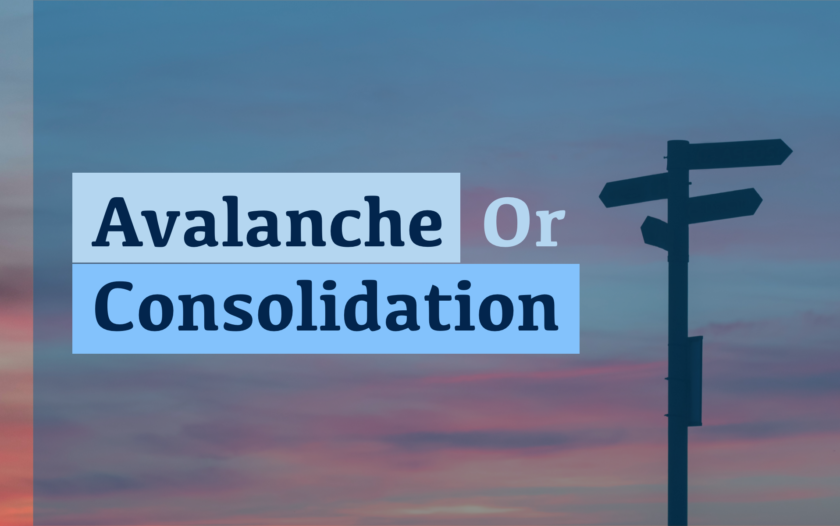Debt Avalanche vs Debt Consolidation
About Kevin
Kevin is a former fintech coach and financial services professional. When not on the golf course, he can be found traveling with his wife or spending time with their eight wonderful grandchildren and two cats.
Read full bio
At a Glance
Eliminating debt is a healthy financial goal that requires hard work and dedication. Many individuals make the initial commitment, yet falter along the way for one reason or another. The key to being successful is to have a solid plan and a budget that you can stick to. For your convenience, we have compared two popular plans for eliminating debt: debt avalanche vs debt consolidation.
Creating a Budget Before Making Your Debt Payoff Plans
Your first step is to create a budget, regardless of which debt payoff plan you choose. You can do this by making a list of all your expenses and comparing them to your total income. Include everything, from essential expenses like rent and utilities to non-essential items like take-out food and entertainment. You should also have a line item for “miscellaneous.”
The idea behind a budget is to get a grasp on how much you’re spending each month. Once you can see that, look for areas where you can cut expenses. It helps to list them as “essential” and “non-essential.” Many of the latter can be eliminated. Some of the former, like expensive cable packages or elaborate mobile phone programs, can be cut back.
Once all your cuts have been made, separate all your monthly debt payments. This should include your credit cards, any personal loans you’ve taken out, and auto loans. List your mortgage also, but keep it separate for now. Your debt payoff plan will be targeted at getting rid of the smaller, high-interest debts first. You have two choices for doing that:
Option #1: Debt Avalanche
Debt avalanche is a strategy where you make minimum monthly payments on all your debt accounts, but then add an extra payment to the account with the highest interest rate. The amount of that extra payment is determined by what you have leftover after allocating money for expenses on your budget. That’s why we had you do that part first.
Once that first account has been paid in full, move on to the account with the next highest interest rate. Make your extra payment and add whatever you were paying for a minimum monthly payment on the first account. Using this method, the amount of spending power you have available to pay debt should increase every time you close out an account.
Option #2: Debt Consolidation
Your second option is to apply for a debt consolidation loan. This is a good choice for individuals who are carrying large amounts of high-interest credit card debt. The loan will be used to pay those balances off and you’ll just need to make monthly payments on the loan each month. The interest rate should be significantly lower, which is what makes this option extremely popular. Use our debt consolidation calculator to see how much you could save.
One thing to be cautious of if you choose debt consolidation is that your credit cards will have large available balances after you use the loan to zero them out. The key to making this technique work is not to use those cards. Many folks have gotten into trouble by piling up new credit card debt while they’re still paying off the consolidation loan. That defeats the purpose.
Comparison: Debt Avalanche vs Debt Consolidation
Which of these solutions is right for you? Earning something makes you appreciate it more, so debt avalanche is a better option if you can afford to put in the time and effort to stick with it. Debt consolidation is a useful shortcut, but won’t do you any good if you don’t learn to change your spending habits. Debt avalanche requires discipline and patience, two useful qualities in all areas of your life.
Obviously, we can’t make this decision for you. Review both of these options carefully and you’ll reach your own conclusion in the debt avalanche versus debt consolidation debate. Remember, the ultimate goal is to be debt free. Which one will help you get there faster?
Frequently Asked Questions
When is the debt avalanche strategy a good idea?
The debt avalanche debt reduction strategy is always a good idea. Getting rid of high-interest credit card debt can free you up to save and invest for your future. It’s also a good strategy for those with less-than-perfect credit who may not qualify for a debt consolidation loan.
Is debt consolidation good or bad?
There are pros and cons to debt consolidation, which are important to research before taking on another loan. In terms of your credit score, paying off debt quickly with a debt consolidation loan may or may not have a positive effect on your credit score. Most scoring agencies like to see financial maturity by making your monthly payments on time.









